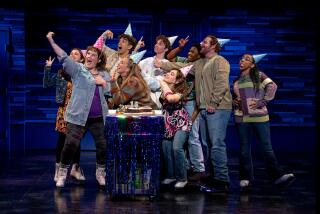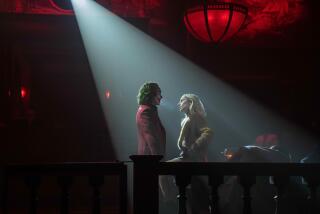Television review: ‘Smash’ on NBC
The exultant anticipatory buzz preceding the premiere of NBC’s “Smash” has grown so intense that the conversation is no longer about whether it’s any good (“Good? Darling, it’s great!”) or if it will be a hit for a network that needs one. Instead, everyone’s wondering why no one thought of doing this kind of show before.
“This kind of show” being a spare-no-expense showcase chronicling the gestational stages of a Broadway musical. Chorus boys! Dueling divas! Post-audition meltdowns!
I’ll tell you why: Because it’s extremely difficult to do.
The wonder of “Smash” is not that it’s a grown-up “Glee” (it isn’t) or that it stars “American Idol” runner-up Katharine McPhee (bringing the modern evolution of musical television full circle) or that the show-within-the-show — “Marilyn: The Musical” — seems prepped and ready for a real Broadway run.
It’s that creator Theresa Rebeck and her team have managed to capture the grand and sweeping gesture that is musical theater and inject it with the immediate intimacy of television.
Or maybe it’s the other way around. Either way, no one’s ever done it before. At least not recently.
Theater and television may tell similar stories, but they do it very differently. The stage is big; the TV screen is small. Onstage, actors play to the front row and the balcony; on television, actors play to the camera, often mere inches away. Theater is at once more bombastic than television and more minimalist — a bare platform can be a balcony, a car, a bedroom.
The creators of “Smash” honor both genres, and what easily could have lurched across the screen like some dramatic-arts Frankenstein is instead as supple as a showgirl. Without benefit of voice-over, green-screen or any other narrative crutch, “Smash” moves effortlessly between the broad strokes of the musical — “Hey, I’ve got an idea for a show, and (pause, jot-jot, plink, plink) here’s the first number!”) — and the more personal demands of TV, giving the characters just as much attention as the choreography.
Embodying this embrace of two worlds are the women competing for the big part in “Smash.” Megan Hilty, who plays longtime trouper Ivy, is a real Broadway star, and you can tell the moment she shows up. With her enormous eyes, big singer’s mouth and delightful curves, Hilty has much more oomph than most women on television are generally allowed. By contrast, McPhee’s Karen is decidedly waifish in her charms, a fact wisely acknowledged by the characters trying to decide between them as they cast the starring role in “Marilyn: The Musical.”
“Marilyn” is a new play emerging, even as the show progresses, from the pad and piano of Julia Houston (Debra Messing) and Tom Levitt (Christian Borle), longtime collaborators who love each other in the way only straight women and gay men can love in a show like this one.
Although Julia has promised her (loving, dull) husband Frank (Brian d’Arcy James) that she is going to take time off from being part of “Broadway’s hottest team” to adopt a baby daughter, the mere mention of Monroe as a musical subject is far too tantalizing. Before you can say “Joltin’ Joe,” she and Tom are cranking out a number and catching the attention of Big Time Producer Eileen (Anjelica Huston). Whose ugly divorce proceedings have frozen all her assets including, wouldn’t you know it, a new production of “My Fair Lady.” Which frees up the lascivious but super-talented director Derek Wills (Jack Davenport). Whom Eileen snags and offers to Julia and Tom, waving away their but-we-only-have-one-number bewilderment even as she pencils in the out-of-town opening.
It’s all totally absurd, of course, but in a breathlessly wide-eyed and knowing way that is terrific fun to watch. And for every bit of bizarre business (are Julia and Frank the only people on the planet who do not know it takes a long time to adopt a baby from China?) there are seven or eight real-life details (“We are not the chorus, we are the ensemble”) to keep things from floating too high into the rafters.
The return of Messing to network television doesn’t hurt either. Swathed in Creative Type scarves, colorful Tina-Fey specs and that signature hair, her Julia is both endearing and irritating. As are most of the characters, each a promising balance of one thing and another — in early episodes Hilty’s Ivy especially vacillates between ego and insecurity in a most convincing and moving way.
Not that “Smash” is to be confused with a moody character study or a biting backstage satire. This is one big unapologetic feather-headress-waving, sequined derriere-twitching, high-note-holding love song to the siren call of song, dance and the theatrical life.
But if there is no adversity, there can be no triumph. And “Smash” is a triumph.
More to Read
The complete guide to home viewing
Get Screen Gab for everything about the TV shows and streaming movies everyone’s talking about.
You may occasionally receive promotional content from the Los Angeles Times.







